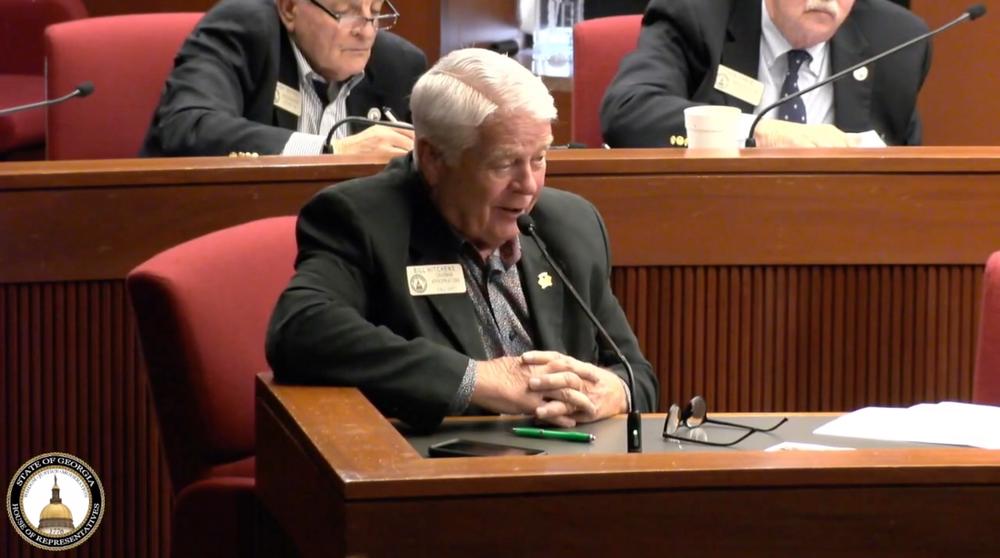
Caption
Republican Rep. Bill Hitchens shares his support for SB 490 based on his experience working with law enforcement.
Credit: Screenshot
On Tuesday, March 19, 2024, the House Public Safety and Homeland Security Committee unanimously passed legislation making it a stricter offense to flee or attempt to escape from police in a vehicle.
Senate Bill 490 states that "It shall be unlawful for any driver of a vehicle willfully to fail or refuse to bring his or her vehicle to a stop or otherwise attempt to elude a pursuing police vehicle or police officer when given a visual an audible signal to bring the vehicle to a stop."
Sponsor Republican Sen. Bill Cowsert of District 45 in Athens fulfilled the request to sponsor the legislation from the Georgia State Patrol and Metro Atlanta Law Enforcement. He says the legislation would increase the penalties for fleeing from an officer.
"The current structure does not make it a felony until your fourth offense," Cowsert said at the committee meeting. "That is a problem, particularly in metro Atlanta areas where some police departments have no chase policies, partly because of the danger that's caused to the public if there's a high-speed chase in a heavy traffic area."
He adds, "The criminals out there are taking advantage of it now, and they are fleeing from law enforcement lawful stops."
Under the current system of punishments for fleeing or attempting to elude:
The new legislation would remove a tier from the current system of punishments, allowing for harsher punishments for earlier offenses.
"What we do is take out one of those tiers in this bill, and we make even a first offense a high and aggravated misdemeanor with a $1,000 to $5,000 fine and 30 days to 12 months in jail," Cowsert said. "On a second offense, it will also be a high and aggravated misdemeanor, which it is not currently. It goes up $2,500 to $5,000 and 90 days to 12 months in jail."
The third offense would be a felony, with a $5,000 to $10,000 fine and one to 10 years' worth of punishment.
"That punishment is the same as it is for a fourth offense now," Cowsert said. "We just took out the third tier and made the first and second offenses high and aggravated instead of simple misdemeanors. Everything else is the same."
What will not change under the new legislation are the circumstances for a misdemeanor charge becoming a felony charge on the first offense.
Those include if the driver of the vehicle:

Republican Rep. Bill Hitchens shares his support for SB 490 based on his experience working with law enforcement.
Republican Rep. Bill Hitchens, of the 161st District in Rincon, has served 28 years in the Georgia State Patrol and was the Commissioner of the Georgia Department of Public Safety and colonel of the Georgia State Patrol. He shared his appreciation for the legislation.
"As the Commissioner of the Department of Public Safety for many years, I was astounded at how many high-speed chases [Georgia State Patrol] get," he said. "I saw some statistics from the Criminal Interdiction Unit the other day here in Atlanta that state patrols have had 800 high-speed chases in the last year. I've been in many of them, and they are horribly dangerous, not just to the public, [but also] to the person you're chasing, and to the individual officer who's chasing them."
Hitchens added, "I really appreciate this [legislation]. It does the world good for the law enforcement community and society overall. I mean, this is a real problem in the metro Atlanta area."
The legislation's message is to guarantee that those instructed to stop by an officer and fail to do so can't take advantage of the current system of punishments with less leeway.
"If you get a command from law enforcement to stop, then you've got to stop," Cowsert said. "This is in official vehicles, not unmarked vehicles, so there's no question these people trying to get away know it's law enforcement. They know they've been asked to stop, and they still disregard that. We need more respect for our law enforcement to allow them to enforce these traffic laws."
Since SB 490 passed in the House Committee without any changes or substitutes, it now faces a vote from the House of Representatives. If the legislation passes in the House, it will head to Gov. Brian Kemp's desk for his signature.